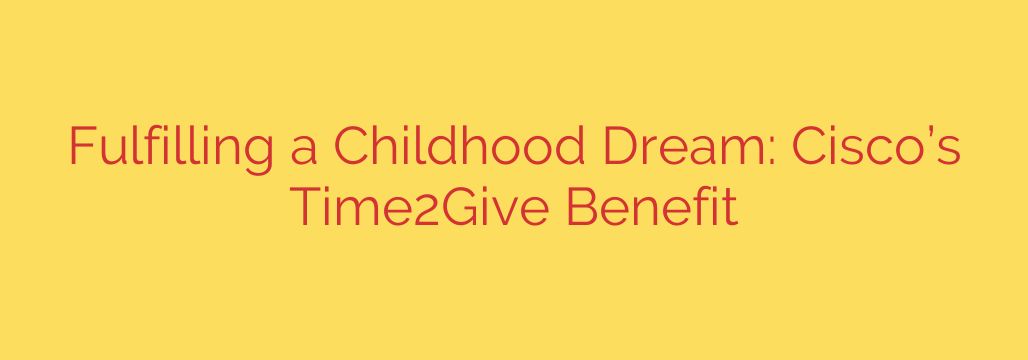
Skills for Good: How Corporate Volunteering is Revolutionizing Community Impact
In today’s professional landscape, employees are increasingly seeking more than just a paycheck. They are looking for purpose, a sense of contribution, and a way to connect their work to the greater good. Forward-thinking companies are responding by creating innovative programs that go beyond traditional benefits, empowering their teams to make a real-world difference. One of the most powerful examples of this is the rise of skills-based volunteering.
Imagine a highly skilled cybersecurity expert who spends their days protecting corporate networks from digital threats. Now, imagine that same expert dedicating their time and unique talents to helping a local police department solve complex cybercrimes. This isn’t a hypothetical scenario; it’s a powerful example of how corporate social responsibility programs can bridge the gap between private sector expertise and public sector needs.
A New Frontier in Public-Private Partnerships
A recent case brought this synergy into sharp focus. A cybersecurity professional, whose childhood dream was to work in law enforcement, was able to fulfill that ambition through his employer’s paid volunteer time off program. He was embedded with a police department’s Cyber Crimes Unit, a team often overwhelmed by the sheer volume and complexity of digital evidence.
The collaboration highlights a critical reality: public sector agencies, particularly in law enforcement, often face a resource gap when it comes to specialized digital expertise. While they are staffed with dedicated officers, the hyper-specialized skills needed for digital forensics—analyzing data from phones, computers, and online accounts—are in high demand and short supply.
By lending his professional skills, the volunteer was able to provide immediate and significant value. He assisted in analyzing digital evidence crucial to a major investigation into child exploitation, helping investigators uncover vital information that moved the case forward. This wasn’t just about giving time; it was about giving a highly specific, mission-critical skill set that the department desperately needed.
The Triple-Win Scenario of Skills-Based Volunteering
This model of corporate giving creates a powerful win-win-win scenario for everyone involved.
- For the Community: Public service agencies gain access to elite talent they couldn’t otherwise afford. This directly enhances their capabilities, whether it’s solving crimes faster, protecting vulnerable populations, or improving essential public services. It allows law enforcement and other organizations to leverage cutting-edge knowledge to better serve and protect the public.
- For the Employee: Professionals get a unique opportunity to apply their skills in a new and profoundly meaningful context. This experience not only provides immense personal satisfaction and a renewed sense of purpose but also offers invaluable real-world experience that can enhance their professional capabilities. It connects their daily work to a tangible, positive impact, boosting morale and fighting burnout.
- For the Company: Businesses that champion these programs see significant returns. They build a reputation as an employer that invests in its people and its community, which is a massive advantage in attracting and retaining top talent. These initiatives foster a loyal, engaged, and more skilled workforce, creating a culture of purpose that drives success.
Actionable Steps for a More Secure Community
The need for digital expertise in law enforcement and public safety is only growing. As our world becomes more connected, so too does the landscape of crime. Here are key takeaways for individuals and organizations inspired by this model:
- Seek Out Opportunities: If you are a professional with specialized skills in tech, finance, marketing, or another field, research non-profits and local government agencies. Many are in need of your expertise but may not have a formal program in place.
- Advocate for Change: If your employer doesn’t offer paid time off for volunteering, be an advocate. Present the business case, highlighting the benefits for employee retention, brand reputation, and skill development.
- Establish Formal Partnerships: Businesses and public agencies should proactively build bridges. Law enforcement can reach out to local tech companies to establish formal partnerships for skills-based volunteering or pro-bono consulting on specific cases.
- Focus on Digital Literacy: Everyone can contribute by prioritizing their own cybersecurity hygiene. Using strong, unique passwords, enabling two-factor authentication, and being cautious of phishing attempts reduces the overall strain on law enforcement resources.
Ultimately, the fusion of corporate talent and public service represents a powerful force for good. When companies empower their employees to use their best skills to solve society’s biggest challenges, they do more than just build good will—they build stronger, safer, and more resilient communities for everyone.
Source: https://feedpress.me/link/23532/17126757/living-my-childhood-dream-thanks-to-ciscos-time2give-benefit








